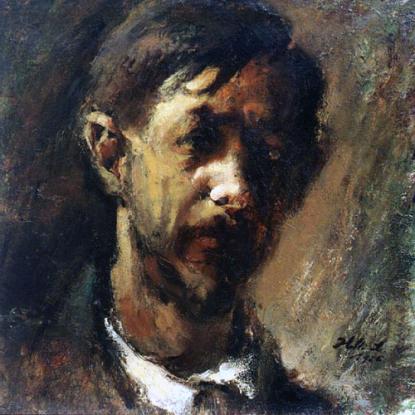2024. November 23. Saturday
László Holló Memorial Museum - Debrecen
|
|
Address: 4031, Debrecen Holló László sétány 8.
Phone number: (52) 428-251, (52) 413-326
E-mail: mfg@medgyessy-debr.sulinet.hu
Opening hours: Tue-Sun 10-16
|
Museum tickets, service costs:
|
Ticket for adults
|
100 HUF
|
|
|
Ticket for students
|
60 HUF
|
|
|
Ticket for pensioners
|
60 HUF
|
The material of the László Holló Memorial Museum, formerly exhibited in the Hrabéczy Cottage, is made up of the works of the artist (1887-1976). The pictures which have a characteristic dark and light tone are easily recognizable. These and the wall paintings fill up several wards. A separate ward was designated to represent the original studio of the artist with his reconstructed tools.

The art of László Holló, born in Kiskunfélegyháza, developed in Debrecen. The boy, whose mentor was Simon Hollósy, studied in Munich and moved to Rome around the time of WWII. The Calvinist Rome eventually became his final residence where he did not only work as a painter but was also known as a public figure. As the president of the Ady Association and the head organizer of the local art camp he proved his worthiness.
In the first decade of his career he created portraits and in the 1920s he seemed to find his own style and topics. Besides the subject pictures he started painting pictures with biblical and mythological topics.
László Holló organized an independent exhibition in 1930 at the Town Hall in Debrecen. As WWII was nearing he became more and more isolated and worked in solitude for a decade. He made his oeuvre richer with self portraits, pictures with historic topics, and portraits after the war. It was always the human being that stood in the center of his topics with its faith, present, past, and psyche. Even his landscapes had a human face; they were moving and breathing.
The extremely dynamic style of László Holló is dramatic, stirring, and very expressive. His series of self portrait is unique in the Hungarian art history. From the sixties he chose lighter topics too, but returned to his favorite topic in the seventies: still lives and landscapes. He received the Munkácsy and Kossuth Price, and was rewarded with the title: Worthy and Prime Artist.

The art of László Holló, born in Kiskunfélegyháza, developed in Debrecen. The boy, whose mentor was Simon Hollósy, studied in Munich and moved to Rome around the time of WWII. The Calvinist Rome eventually became his final residence where he did not only work as a painter but was also known as a public figure. As the president of the Ady Association and the head organizer of the local art camp he proved his worthiness.
In the first decade of his career he created portraits and in the 1920s he seemed to find his own style and topics. Besides the subject pictures he started painting pictures with biblical and mythological topics.
László Holló organized an independent exhibition in 1930 at the Town Hall in Debrecen. As WWII was nearing he became more and more isolated and worked in solitude for a decade. He made his oeuvre richer with self portraits, pictures with historic topics, and portraits after the war. It was always the human being that stood in the center of his topics with its faith, present, past, and psyche. Even his landscapes had a human face; they were moving and breathing.
The extremely dynamic style of László Holló is dramatic, stirring, and very expressive. His series of self portrait is unique in the Hungarian art history. From the sixties he chose lighter topics too, but returned to his favorite topic in the seventies: still lives and landscapes. He received the Munkácsy and Kossuth Price, and was rewarded with the title: Worthy and Prime Artist.
|
Related activities
|
|
